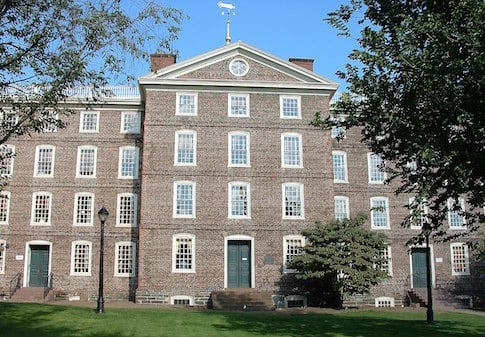Brown University students voted on Monday in favor of reparations for descendants of slaves affiliated with the school’s founders.
Students at the Ivy League school, named after the anti-slavery merchant Nicholas Brown Jr., approved two resolutions urging the school to “identify the descendants of enslaved Africans who were entangled with and/or afflicted by the University and Brown family and their associates.” The resolutions, one giving those identified priority admission and the other direct payments, were passed by overwhelming margins: 89 and 85 percent, respectively.
Brown is the latest university to consider providing reparations. In 2019, Georgetown University approved a plan to provide financial aid to students descended from slaves sold by the school approximately 200 years prior. Both the Virginia Theological Seminary and Princeton Theological Seminary recently drew up plans for how to provide reparations.
Brown University declined to comment about how proposed reparations money would affect the school’s $59,254 annual tuition, but a spokesman told the Washington Free Beacon that “the current work of Brown’s Task Force on Anti-Black Racism will make recommendations on more Brown can do to address the legacy of slavery.” Georgetown originally planned on raising tuition to pay for reparations but ultimately decided against it.
Jordan Allums, the opinion editor of the Brown Daily Herald, and Jason Carroll, the Undergraduate Council of Students president, co-authored a piece for the paper endorsing the reparations plan. The pair wrote that “reparations are not an unfair advantage or a form of unfounded preferential treatment; they are a means to recompense the setbacks that descendants of slavery contend with in the 21st century.”
The campus-wide vote came after the Brown student government passed a resolution, sponsored by Carroll, “calling upon Brown to attempt to identify and reparate the descendants of slaves entangled with the university.”
Sylvia Brown, a historian and descendent of the Rhode Island Brown family, objects to the idea that the university was founded on slavery. The university’s namesake, Brown Jr., opposed the slave trade and forbade captains of his ships from trafficking slaves. Brown also forbade the family-owned Providence Bank from lending to slave traders.
Cities and states across the country have begun implementing reparations plans. The Virginia House of Representatives passed a bill in February that would also require five public colleges in the state to identify the slaves who worked on their schools and offer full scholarships to descendants of those workers. Last week, Evanston, Ill., became the first city to offer reparations in the form of direct payments to black residents. President Joe Biden supports studying a national reparations program.
Last year, Rhode Island changed its official name, the State of Rhode Island and Providence Plantations, to distance itself from the legacy of slavery. Governor Dan McKee (D.) was lieutenant governor at the time, and he endorsed the proposal to rename the state to merely the State of Rhode Island.
McKee’s office did not respond to the Free Beacon’s request for comment about whether the state will facilitate Brown’s efforts to provide reparations.



